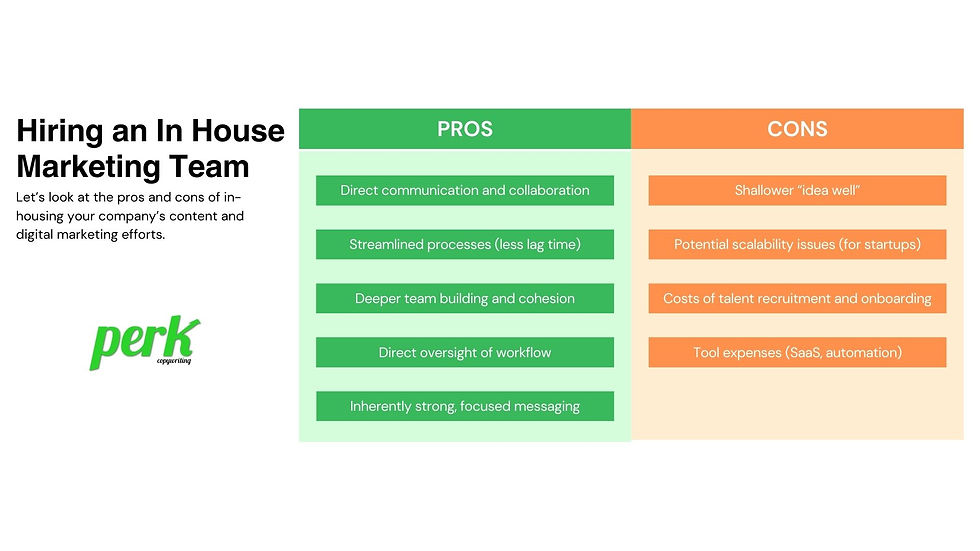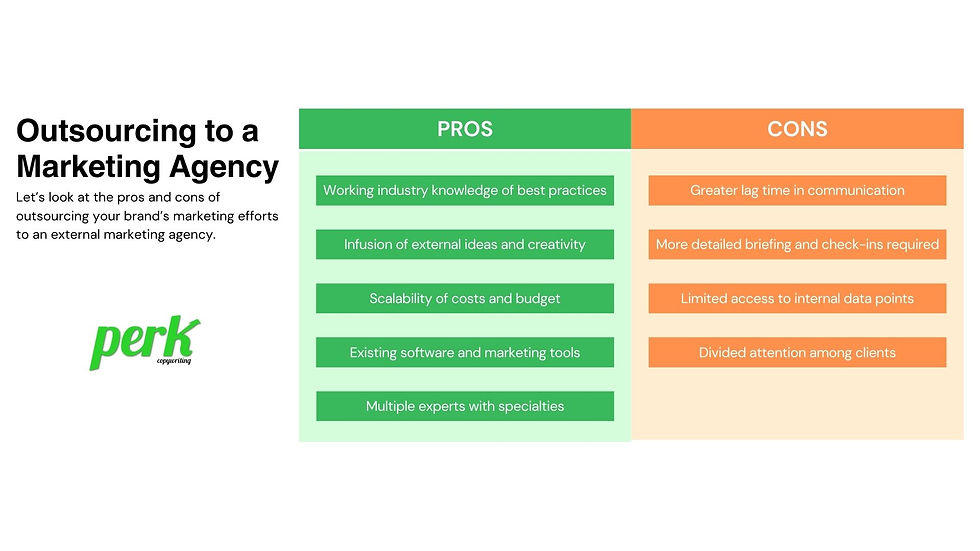In House Marketing vs Agency: How to Decide

Your business marketing strategy is built and ready to go. Before you begin your marketing efforts, there's one core question you must answer — are you building an internal marketing department, or outsourcing to a digital marketing agency?
The choice between in house marketing vs agency marketing isn't easy. My goal in this article is to simplify the choice in as few steps as possible.
Here's what I'll cover in this guide to choosing between an in house marketing team and an external agency:
There are 4 key questions you must answer to choose between internal and external marketing professionals. I'll break them down in a simple decision tree that works for most small business owners.
Digital marketing and content marketing goals should both be handled by the same marketing team. Consistency and familiarity with marketing tools and tasks are vital.
If you're hiring an in house marketing team, you'll have tremendous control over your marketing efforts and workflow — but financial scalability is a major concern.
Outsourcing still requires a “buy in” from your agency partner! Minimize lag time by demanding transparency, accountability and brand education from agencies, contractors and freelancers.
Want to bounce your “in house vs outsource” questions off a marketing expert? Talk to me for free!
In House vs Agency Marketing: Your Decision Tree
Here's a simple decision tree to highlight your selection between an external or internal marketing team (click to expand and download!):

There's a laundry list of pros and cons for hiring an in house marketing team. There's one of equal length for outsourcing your marketing tasks to an external agency.
But pros and cons don't really help you make the decision. Ultimately, your choice between internal or external marketing teams comes down to 4 questions:
Do I have a fully established brand identity?
Can I (or an expert on my team) thoroughly explain that brand identity?
Can I afford new hires at this time?
Am I confident in our ability to establish strong processes in house?
The answers to those 4 questions inform your choice between in-housing or outsourcing your marketing needs. The pros and cons are something to weigh out later — keep your decision simple.
What Are In House, Agency and Hybrid Marketing Services?
Your journey through the decision tree has led you to one of 3 outcomes — hiring an in house marketing team, outsourcing to a digital marketing agency, or a short-term hybrid approach.
Here's how each of these outcomes is defined:
In House Marketing Team
You're ready to bring your small business marketing initiative in house. You are confident in your brand identity (and your ability to explain it to team members). You can afford new hires, and your marketing leadership displays a strong ability to establish and implement processes for meetings, check-ins and marketing tactic best practices.
All of your company's marketing assets and marketing campaign strategies will be handled internally. This includes advertising copy, inbound marketing initiatives, content marketing, digital marketing, social media marketing, keyword development and SEO.
External Marketing Agency
You aren't in a position to make new hires, either financially or systemically. Or perhaps you aren't quite certain of your brand's core identity — its mission, vision and purpose. That's okay!
Rely on the expertise of an external agency or contractor to handle your content creation and digital marketing strategy. Look for agile agency teams that can provide effective marketing solutions that fit within your budget. (Think vertical, not horizontal!)
Need help with your decision? Ask me for a free consultation about the right marketing team option for you.
Short-Term Hybrid Strategy
Utilize a short-term hybrid approach to building marketing teams if you want to move your marketing in-house, but aren't quite sure how to implement processes and communication.
Begin building your desired team on a contract-to-hire basis. Then, designate one outsourced marketing expert as your coordinator through a 3-to-6 month onboarding process.
Assign that expert as a short-term marketing manager, with the task of establishing best practices for your future team. Lean on their marketing experience to accomplish 4 key goals:
Educate your contract-to-hire team about your brand identity and marketing strategy
Introduce your team to your desired marketing tools and
Implement a series of processes, check-ins, and meetings to streamline the marketing process.
Deliver this series of processes to you and your leadership team.
After these 4 key goals are met, you'll be ready to move away from a hybrid approach and on to your fully onboarded in house marketing team
Personal note: I love the short-term hybrid approach for any small business owner or startup founder who wants to properly onboard, train and set up an in-house marketing team for success. It's part of a smart roadmap to startup marketing strategy.
.
Pros and Cons of an In House Marketing Team
If our decision tree led you to strongly consider setting up an internal marketing team, walk in with your eyes open. There are significant benefits and drawbacks to doing so. Most benefits revolve around streamlined processes and cohesive messaging, while most drawbacks deal with initial expertise and financial scalability.

Benefits of Keeping Your Marketing Team In House
Here are 5 benefits of establishing an in-house marketing team:
1. Direct communication and collaboration. Want to get in touch with your marketing department? There's no wait when they're in-house. Communicate, chat, collaborate and set up jam sessions whenever the inspiration hits.
2. Streamlined processes. No waiting on your external marketing agency to get back to you on that content question or media request. There's also no need to jam meetings into someone else's schedule — your team reports to you on your schedule.
3. Deeper team building and cohesion. Your team has the opportunity to work together on a daily basis, leading to a strong confluence of ideas and building a sense of team cohesion.
4. Direct oversight of workflow. Gain direct oversight into the day-to-day workflow and marketing activity of your team members.
5. Inherently strong, focused messaging. There's less potential of a vague brief causing poor messaging when you handle a marketing initiative in-house.
Potential Drawbacks of An In House Marketing Team
These are 4 potential drawbacks of handling your marketing efforts in house:
1. Shallower “idea well”. An in-house team's marketing ideas and concepts are only as deep as their previous knowledge — and are limited to the confines of your workspace (even remotely). You won't get the depth and breadth of creative ideas an agency can provide.
2. Potential scalability issues. You're going to pay between $45,000-$55,000 per year for one junior level marketing employee — and that doesn't count onboarding or ongoing education. If you're a startup or small business looking to grow, these numbers can present major scalability issues.
3. Costs of talent recruitment and onboarding. The cost of recruitment and onboarding isn't purely financial. Most marketing positions take upwards of 8 weeks to fill, plus another 2-4 weeks of onboarding and training. If you don't have 3 months to wait on increasing brand awareness, consider outsourcing.
4. SaaS, marketing automation and other tool expenses. You'll have to buy, lease or license all the software and marketing tools needed for an in-house department to compete and succeed.
Pros and Cons of Outsourcing to a Marketing Agency
It's in my best interest to “puff up” all things wonderful about agency marketing — but this article is for your benefit, not mine. So let's take a realistic look at common pros and cons of outsourcing your marketing campaign to an agency.
Most benefits revolve around industry expertise and financial flexibility, while potential drawbacks involve lags in communication and detail-heavy briefings.

Benefits of Hiring a Marketing Agency or Contractor
These are 5 benefits of outsourcing to an external marketing agency:
1. Working industry knowledge of best practices. Unless you're a highly established brand with a strong budget, you'll likely be onboarding newer marketing professionals to an in house team. An external agency is replete with marketing experts who operate within the framework of current industry best practices on a daily basis.
2. Infusion of external ideas and creativity. Marketing agencies are used to a free flow of ideas and creative sparks — not just for your brand, but for many. Business owners who outsource their marketing open themselves up to unique marketing campaign ideas from a broad base of perspectives.
3. Scalability of costs and budget. It costs roughly $175,000-$200,000 per year to hire 3 entry-level marketing employees full-time. If you don't have that kind of marketing budget — or you don't need full-time staff — it makes sense to outsource your marketing needs to an agency or independent contractor.
There's no such thing as “too small a marketing budget” — let's solve your problems at scale.
4. Existing software and marketing tools. No paying for marketing automation, software and other tools — your agency pros already have them and use them every day. This also means no time and money spent educating your own team on their features.
5. Multiple experts with specialties. You could hire an SEO expert, a content marketing guru, a digital marketing specialist, a social media influencer, and a brand identity manager. Or you could outsource to an agency and get them all under one roof.
Potential Drawbacks of Outsourcing Your Marketing
Here are 4 potential drawbacks to working with an outsourced marketing expert:
1. Greater lag time in communication. Need an update on your marketing activity? Expect some lag time in communication that you wouldn't have with an in-house team. Incorporate your external agency as best as possible on your Slack or other enterprise software to speed up the conversation.
2. More detailed briefing and check-ins required. Similar to onboarding a new in-house team, an agency needs team to get to know you, your brand and its mission, vision and purpose. You'll need to submit more highly detailed project briefs than you would to internal marketing staff.
3. Limited access to internal data points. Your digital marketing agency can't log into your internal files or company's Slack and get the same access to your IP and other internal data points. As a result, there may be greater initial back-and-forth with quantitative marketing campaign materials.
4. Divided attention among clients. The better your marketing agency, the more clients they're likely to serve. Expect some division of focus with agency marketing pros — the good ones will give you their full attention during meetings, check-ins and other collaborative sessions.
Then again, if your marketing pros don't make you feel like the only voice in the room, you're with the wrong service.
Conclusions: What's Right for You?
The pros and cons of choosing between an internal marketing department or external marketing agency are numerous — but don't let them cloud your decision-making. Ultimately, your choice comes down to 4 simple questions about brand identity, financial status and ability to implement processes.
I don't envy a business owner making this choice, and I hope my advice made your decision a simpler one. I'd love to be a part of your journey towards establishing a marketing process for your brand in one of 2 ways:
As a consultant, using a short-term hybrid contract to establish industry best practices, processes and checkpoints for your new in house team; or
As a trusted marketing partner, using my expertise to build an effective marketing strategy that fits your needs, your future goals, and your current budget.
Let's have a conversation about how to write the next chapter of your brand's marketing efforts.

Comments